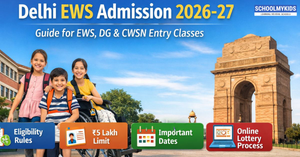You've just finished your Class 10 boards in February. You're finally free. Not anymore. Starting in 2026, CBSE students will face a completely new reality: a second board exam in May.
This isn't a rumor or a proposal anymore. CBSE has officially announced that from February 2026, Class 10 students will write their boards twice in the same year. The first exam is mandatory for everyone. The second one is optional, but only if you want to improve your marks in up to three subjects.
On the surface, it sounds like a gift; a safety net, a second chance. But dig deeper, and you'll find teachers, principals, and education experts asking some tough questions. Will this really reduce stress, or just stretch it over more months? Will students get more learning time, or less?
What's the Actual Plan?
CBSE will conduct the first board exam in mid-February. This exam is mandatory for everyone. Results will be declared in April.
Then comes the second exam in May, which is optional. But you can only improve your marks in up to three subjects. These subjects must be from Science, Mathematics, Social Science, or languages. The second round of results will be announced in June.
Your best score from either attempt counts as your final result. Internal assessments and practicals will only be conducted once, before the first exam.
Important Rules You Should Know
Not everyone can just appear for the second exam. Here are the restrictions:
If you pass the first exam, you can improve your marks in a maximum of three subjects (from Science, Math, Social Science, or languages). If you miss three or more subjects in the first exam, you'll be marked as "Essential Repeat" and won't be allowed to take the second exam. You'll have to wait and appear again next year in February.
Students who get compartment results can appear in the second exam under the Compartment Category. Both exam fees must be paid upfront during registration, and there's no refund if you decide to skip the second exam.
The Good Side: Why Some People Support It
Let's be fair and start with the positives.
The Union Education Minister has called this a "student-centric approach" that aligns with global education practices. The idea is to reduce exam stress and create a more joyful learning environment.
Some educators believe this gives students appearing for competitive exams more time to prepare. If you take your boards early in February, you get extra months to focus on entrance exams like JEE or NEET.
There's also the argument that having a second chance reduces the do-or-die pressure of one single exam. We all have bad days—maybe you're sick, stressed, or something personal is going on. With two attempts, that one bad day doesn't ruin your entire year. You can improve in up to three subjects if needed.
The idea aligns with the National Education Policy (NEP) 2020, which emphasizes student choice, flexibility, and reducing the burden of single high-stakes exams.
The Reality Check: Why Educators Are Worried
While the theory sounds nice, school principals and education experts are pointing out some hard truths.
Learning Time Gets Squeezed
Think about this: each board exam cycle takes about 52 days when you count preparation, conduct, and evaluation. Two exams mean 104 days out of roughly 180 teaching days in a year. Add holidays, weather disruptions, and school events; when does actual teaching happen?
Principals are genuinely concerned that your learning days will shrink significantly. Less time in class means teachers rushing through topics, and you get less time to actually understand concepts.
Teachers Are Already Stretched Thin
For four months during board exams, teachers are busy with duties like being examiners, evaluators, and center supervisors. Now imagine this happening twice a year. Who's teaching when everyone's occupied with exam duties?
Teachers might not even get their summer vacation if the evaluation continues into June. The mental stress and workload could push good teachers away from the profession altogether.
Will You Really Feel Less Stressed?
Will having two exams actually reduce your stress, or will it just mean being stressed twice?
Some educators worry that instead of preparing seriously for one exam, students might become casual about the first attempt, thinking, "I'll do better in the second one." Then, when results come out, and they're not great, the pressure starts all over again.
There's also the concern about mental health. Prolonged exam periods mean prolonged anxiety for you, your parents, and your teachers.
The Gap Between Schools Widens
Students in well-funded private schools might get extra coaching and support for both exam attempts. But what about government schools with fewer resources and more students? They're already struggling to manage one exam cycle properly.
This system could create a wider divide between those who can afford extra support and those who can't.
What's Missing from This Plan?
The system isn't actually changing how or what you're being tested on.
You're still being tested on the same old curriculum in the same old way. If the exam pattern, syllabus, and teaching methods remain outdated, what's the point of having two exams? You're just repeating the same process twice.
Some experts argue that, instead of two board exams, we should focus on continuous evaluation throughout the year through projects, portfolios, and assignments. That would give a much better picture of what you actually know and can do.
The Big Question: Do We Even Need Class 10 Boards?
Several educators believe Class 10 shouldn't have board exams at all. The main purpose of your Class 10 result is to choose a stream for Class 11. Teachers could help with that decision based on your performance throughout the year and aptitude tests.
Only students who need board certificates for vocational training or specific programs should have to take them, and it should be optional.
Conclusion
The intention behind the two board exams seems good as it aims to reduce pressure, give second chances, and align with modern education policy. But the execution raises serious questions.
Without proper changes in curriculum, teaching methods, resources, and support systems, this might end up being what one educator called "a cosmetic fix" rather than real reform.
What education really needs isn't more exams, but better ways of teaching and evaluating. Until that fundamental shift happens, adding another exam might just mean doubling the problems we already have.
The debate is far from over, and hopefully, decision-makers are listening to the concerns being raised by those who work with students every day.









Be the first one to comment on this story.